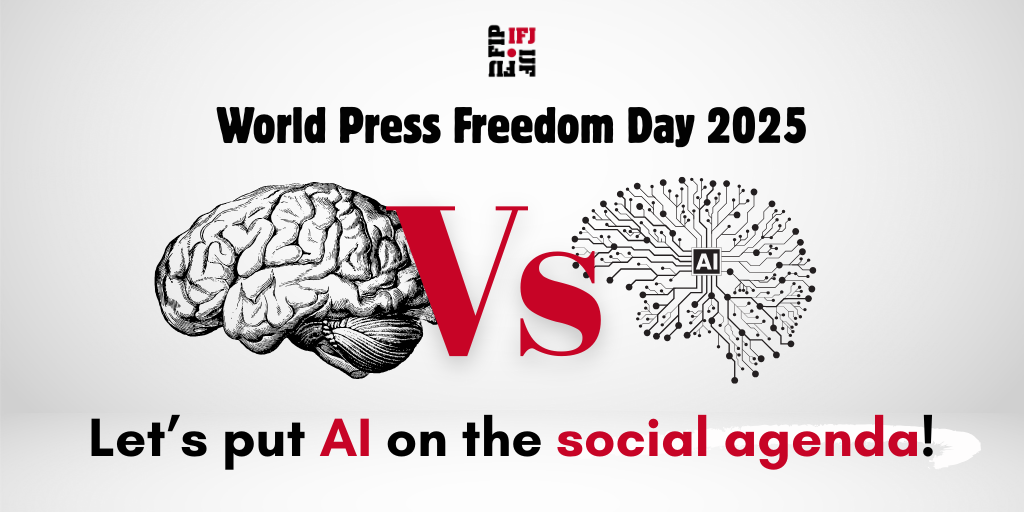In line with UNESCO’s theme for this year, ‘ Reporting in the Brave New World – The Impact of Artificial Intelligence on Press Freedom’, the IFJ urges journalists, unions, and media organisations to engage in collective action to ensure that AI serves the ethical creation of news, protects press freedom, and sustains jobs.
In its recommendations on the use of Artificial Intelligence adopted in June 2024, the IFJ highlighted that “AI cannot replace human journalists, and its output must not be considered ‘journalism’, save where it has been subject to appropriate human oversight and checking.”
Fact-checking and critical thinking are at the core of journalism: AI cannot do them independently. The IFJ warns in particular against bias, stereotypes and factual errors that can contribute to misleading audiences. The federation points that journalists are essential for these tasks.

The rise of AI-fuelled online disinformation is another threat, requiring a response in the form of journalists’ scrutiny. Deep fakes are particularly challenging, reminds the IFJ. “Deep fakes are a direct attack on democracy and on people’s fundamental right to reliable and independent information,” says Anthony Bellanger, IFJ General Secretary. “Journalists are on the front lines of this drift, and their verification work is becoming increasingly important although complex.”
The IFJ is urging trade unions and media to address the issue of Artificial Intelligence, as part of their social dialogue. AI is reshaping newsrooms, automating routine tasks, assisting with data analysis, and even generating content. This technology has the potential to improve efficiency and save journalists from doing mundane tasks such as data collection. But the IFJ is concerned that little has been done in the social dialogue to ensure the ethical use of AI in newsrooms, e.g. directly addressing clauses on transparency. The Federation is particularly concerned that AI could ultimately replace editorial decisions, which are currently made by professional staff in newsrooms.
Additionally the Federation has specific concerns about the use of journalistic works to feed AI. This often automatic process can lead to journalists not being compensated for their articles, unless a specific agreement has already been made with the relevant media organisations. Licensing agreements between news organisations and AI companies should ensure that journalists are fairly compensated for their contributions and allow journalists to opt out if they refuse their works being used in this way.
Unions and media should also ensure that journalists, including freelancers, receive proper AI literacy training. They should also help journalists make this work transition.
“It is high time for everyone in the sector to jointly reflect on how journalism can adapt to the evolving landscape of AI, while safeguarding its ethical standards and the core values of press freedom,” says Bellanger. “The future of journalism is one where human oversight, transparency and accountability remain at the centre of AI usage. We must ensure that technology serves to enhance the work of journalists, not undermine it.”
The IFJ calls on all stakeholders - journalists, unions, media organisations and policymakers - to work collaboratively in developing AI guidelines that prioritise the rights and well-being of journalists. This goal should include setting clear boundaries for AI’s role in newsrooms, fostering transparency in AI processes, ensuring that journalists get compensated and can opt out of their work being used by AI, and protecting editorial independence. The Federation also highlights the importance of collective bargaining, to guarantee that journalists’ voices are heard as these technologies become more integrated into the media landscape.









